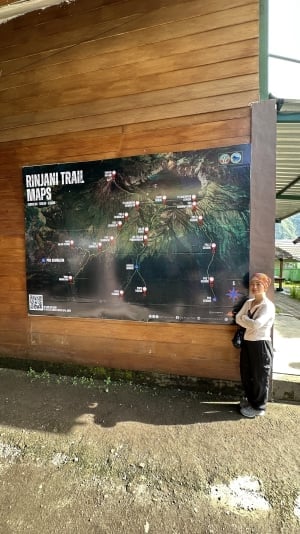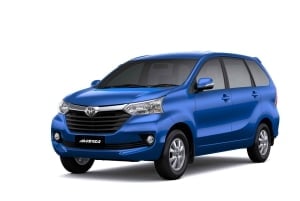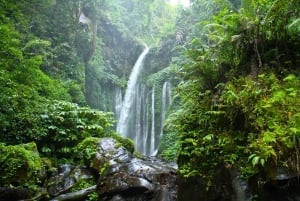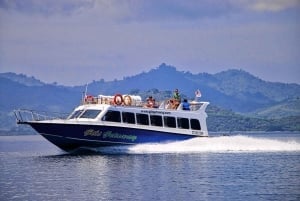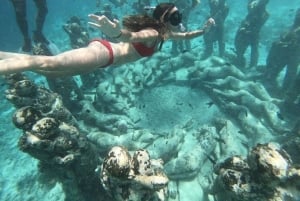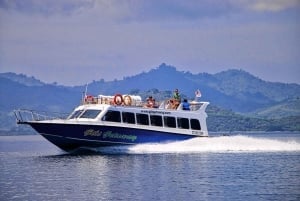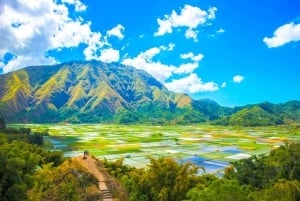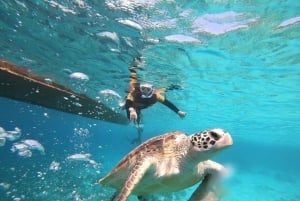Practical Information - Gili Islands
Weather
The Gili Islands’ climate is generally drier and hotter than on . Throughout the dry season from April to October, there is very little rainfall and inland, where there are very few sealed roads, it can become very arid and dusty. Even in the rainy season during winter months, it is often hot and humid. High factor sun cream and drinking plenty of liquids is a must.
Money
There are several ATM machines available on Gili Trawangan and Gili Air, but so far Gili Meno has yet to get one. Plastic can be used at larger hotels and villas, some restaurants and dive shops, usually with a minimum 3% service charge added on top of the bill. There are several money changers around to exchange foreign currency but you will get much better rates in Lombok before arriving. It pays to have a small emergency fund of rupiah with you as the ATM machines sometimes go offline or simply run out of cash. During the peak months of July and August all ATM machines (especially on Gili Trawangan) are almost always empty by the evening so stock up on cash early.
Health Services
There are limited health services on the islands. Gili Trawangan has a 24-hour clinic located at Hotel Villa Ombak which can prescribe medicines and perform very minor surgery. There is also a smaller clinic behind the Art Market (Pasar Seni). On Gili Meno and Gili Air you will find small local clinics only. If you require urgent medical attention, you will need to travel to Lombok by speedboat (Mataram has the best medical care and is a minimum one hour journey from the Gili Islands.) All dive centres are accredited and follow stringent safety procedures – all the diving staff has first aid training and there are basic medical supplies available. It is essential to have comprehensive medical insurance when in Indonesia and preferably one that includes air evacuation.
Electricity
Each of the three Gilis has its own island generator providing round-the-clock electricity but outages do sometimes occur, and more frequently during the peak months of July and August when power usage is at its highest. If you are planning to stay in a small homestay, enquire if they have an emergency back-up generator, or at very least, invest in a small torch! Indonesia uses two-pin plug sockets and it is advisable to bring a universal adapter with you.
Water
Fresh water on the islands is in short supply as it is shipped over from Lombok. On Gili Trawangan, desalinated water is now available, so fresh water showers are becoming more common although due to the relative high cost, many budget homestays will only have salt water showers. Tap water is not potable but bottled drinking water is very cheap and readily available everywhere.
Internet
Many larger hotels and beachfront restaurants now offer free WiFi access. On each of the three islands, there are internet cafes however connections can be intermittent and high bandwidth use such as video skype calls can be slow and frustrating.
Transport on the Islands
All motorised transport is forbidden on the islands, ensuring an idyllic tropical island paradise free of pollution. You can walk, ride a bike or take a 'cidomo' - traditional horse and cart - around the islands. It takes less than two hours to leisurely walk around any of the islands. You can hire bicycles at numerous places from the beachfront on all the islands for no more than Rp50,000 for a day and bargaining is possible. Another option is to take a cidomo, which is definitely a good option if you are feeling a little worse for wear after a late night or during a heavy downpour. Cidomo fares are now fixed by law and the prices are displayed on the front of the cart.
Dress
The Gili Islands are Muslim and nude or topless sunbathing is definitely frowned upon and you should take care not to bare too much flesh when walking past a mosque. However this being a hot, tropical region, the dress code is very relaxed and it is normal to see tourists walking around in swimsuits, sarongs, shorts and singlet tops. Bear in mind that if entering a shop or a local home, it is customary to remove your shoes or sandals first.
Mosquitoes
In the rainy season mosquitoes can sometimes be a problem, so it is advisable to bring mosquito repellent with you. If you need to buy it once you are here, it is readily available for sale at most shops on the islands.


